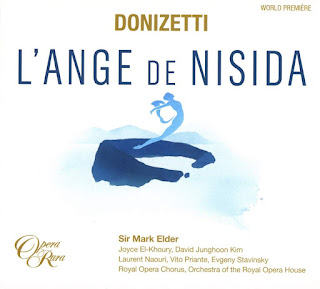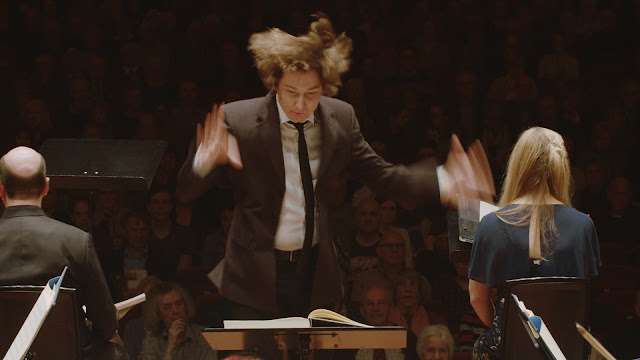Fazil Say Violin concerto 1001 nights in the harem; Iskandar Widjaja, Iraz Yildiz, ORF Vienna Radio Symphony Orchestra, Howard Griffiths; Sony
Reviewed by Robert Hugill on 5 February 2019 Star rating: 4.0 (★★★★)
Seductive exoticism and a rich tonal palate, the music of Turkish composer Fazil Say
This disc of music by the Turkish composer Fazil Say owes its origins to the Orpheum Foundation for the Advancement of Young Soloists, and its programme to provide young soloists with their first experience of the recording studio.
Howard Griffiths, artistic director of the Orpheum Foundation, conducts the ORF Vienna Radio Symphony Orchestra in Say's violin concerto 1001 Nights in the Harem, with violinst Iskandar Widjaja, Grand Bazaar rhapsody for orchestra, and China Rhapsody for piano and orchestra with pianist Iraz Yildiz. Say's orchestration includes a number of Turkish percussion instruments, including the Kuldüm drum, played by Aykut Köseleri.
The violin concerto, inspired by Sheherezade and the 1001 Nights, was premiered in 2007 by Patricia Kopatchinskaya. The concerto doesn't so much tell a story as first of all introduces us to the inhabitants of the harem and then evoke an atmosphere.
The first movement starts with just violin and drum, before the full orchestra joins in. Say combines Turkish melodic fragments with rich and complex harmonies, yet there are also poetic moments for the violin alone. The richness of the palate rather reminds me of Rimsky Korsakov, yet clearly more modern folk-inspired composers like Enescu and Bartok are there too. The Turkish melodic and harmonic influences are central to the piece, not just window dressing. The second movement starts as a fast furious dance with lots of drums and giving us some exciting furious fingerwork from Iksander Widjaja. The third movement is quietly evocative with night-music type sounds in the orchestra, and even when a gentle dance starts we hear the night in the background.
Another composer that I though of when listening to this was Korngold for the combination of exoticism, lyricism and heart on sleeve romanticism and yet here with added spice. The finale is extraordinarily spare, virtually violin and percussion alone at first, then the violin providing birdsong over a Turkish theme in the orchestra. The soloist Iskandar Widjaja is the son of Arab/Dutch and Chinese/Indonesian parents. He trained at the Hanns Eisler University of Music Berlin.
Fazil Say's love of colour and richness of tonal palate really comes over in the orchestral rhapsody,
Grand Bazaar from 2015/16, a collage of sounds and influences which receives a vivid and exciting performance. This continues with the final work on the disc,
China Rhapsody for piano and orchestra. This creates a positively cinematic picture with harmonies, timbres and melodic fragments inspired by China woven in. The result is the sort of cross-polinating rhapsody of which 19th century composers were fond, but the embedding of Chinese melodies and harmonies in a Western-style orchestration by a Western-trained Turkish composer was a combination which did worry me somewhat.
There is much to enjoy on this disc from the colour and imagination of Fazil Say's music to the fine performances from the young soloists.
Fazil Say (born 1970) - Violin concerto 1001 nights in the harem, op. 25 (2007)
Fazil Say - Grand Bazaar, rhapsody for orchestra op. 65 (2015/16)
Fazil Say - China Rhapsody for piano and orchestra op.69 (2016)
Iskandar Widjaja (violin)
Iraz Yildiz (piano)
Aykut Köseleri (percussion)
ORF Vienna Radio Symphony Orchestra
Howard Griffiths (conductor)
Recorded 21-24 August 2017, ORF Funkhaus Wien.
SONY
Available
on-line.
Elsewhere on this blog:
- Thrilling dynamism: Taverner's Missa Gloria tibi trinitas on Signum (★★★★★) - CD review
- Imaginative debut: Rarities by Lalo and Milhaud on Hee-Young Lim's debut disc of French cello concertos (★★★½) - Cd review
- Not heard since its 1956 premiere: Eugene Bozza's oratorio Le chant de la mine from Valenciennes (★★★½) - Cd review
- One last show: Bury Court Opera draws the final curtain, with a terrific account of Britten's The Turn of the Screw (★★★★½) - opera review
- Almost music theatre: song cycles by Dominick Argento and Robert Schumann from Sarah Connolly at Wigmore Hall (★★★★) - concert review
- Emotional soundscapes: the music of young Australian composer Brendon John Warner on his debut album La fonte - CD review
- Highly engaging: revival of Mozart's The Magic Flute from Simon McBurney, ENO & Complicité (★★★★½) - opera review
- Magnificent original: Tchaikovsky's Swan Lake restored in a superb performance from Vladimir Jurowski on Pentatone (★★★★★) - CD review
- Intimate conversations: the young Jubilee Quartet in three quartets spanning 20 years of Haydn's maturity (★★★★½) - CD review
- Riveting drama: Peter Konwitschny's production of Halevy's La Juive at Opera Vlaanderen (★★★★★) - opera review
- Claustrophobic & atmospheric: Verdi's Macbeth from English Touring Opera (★★★½) - opera review
- Letting the music speak for itself: Mozart's Idomeneo from English Touring Opera (★★★★½) - opera review
- Cadogan Hall debut: the Gesualdo Six in a programme of Renaissance and Contemporary (★★★★) - concert review
- Home

































%20in%20The%20Merry%20Widow.%20Credit%20Mihaela%20Bodlovic.%20(2).jpg)

%20in%20Trial%20by%20Jury.%20Credit%20Mihaela%20Bodlovic..jpg)

.jpg)
%20Britten%20Pears%20Arts%20(1).jpg)


